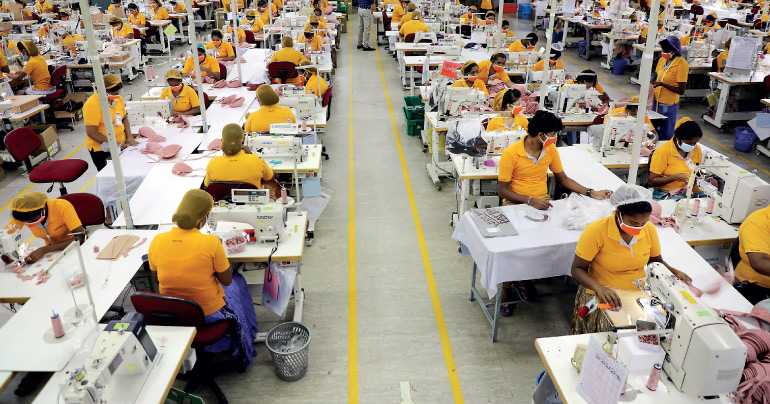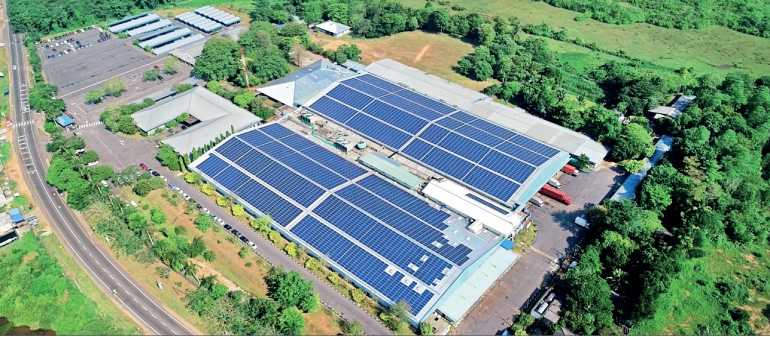Sunday Feb 15, 2026
Sunday Feb 15, 2026
Thursday, 17 September 2020 00:11 - - {{hitsCtrl.values.hits}}

Creating value for employees has been an integral part of integrating sustainability into our business. Today, employee health, safety and wellbeing take priority and physical distancing protocols are strictly followed within our plants

A thriving business depends on a thriving community. Supporting schools and enabling the next generation of sustainability leaders is a key component of creating value for our communities
In today’s world, businesses are faced with an unprecedented mix of social, environmental, and economic challenges. From the likes of the COVID-19 pandemic, to the climate crisis, and political and social unrest in countries across the world, these challenges require companies to strategise in a manner that helps to futureproof their operations and build resilience into business planning. 
Integrating sustainability into business strategy is considered an important tool in protecting businesses from risks, while developing organisational resilience. To truly integrate sustainable practices into business, companies need to be cognisant of and plan for potential impacts of global events and take into consideration the many different spheres of influence that are changing the way that our world operates.
What is sustainability in business?
Sustainability has been a buzzword in business for several years, but today it has become a ‘must have’ element in creating a truly futureproof organisation. While social and environmental sustainability are key components, a sustainable business model must go beyond this to create value to stakeholders, whilst also commanding a commercial advantage.
A sustainable business should address unmet needs of consumers, with the business model considering how to develop solutions today for the challenges, opportunities, and trends of tomorrow. A sustainable business must create value, not only for itself, but for its customers, consumers, employees, shareholders, and for all other stakeholders up and down the value chain, by influencing the wellbeing of each ecosystem within which it operates.
True business sustainability considers how battle ready the organisation is in the face of external forces, and how adaptable it is to change amid the most dynamic environments. It is agile, resilient, and constantly evolving. Through an expansive, long-term view of its value chain, a sustainable business is aware of its impacts and how its decisions and actions influence the equilibrium of its ecosystems. These qualities help organisations build the ability withstand external shocks, strengthen its adaptability, and stay relevant.
Integrating sustainability into business – what does it mean?
Strategically integrating sustainability into a business requires engaging through several organisational perspectives. An integrated thought process which considers a holistic value creation model is essential. Innovation is also an integral element, from creating new products that are better for the consumer, to introducing processes that improve efficiency, increase employee wellbeing and create shared value for all stakeholders.
The operationalisation of sustainable practices is important, whether it be introducing environmental sustainability parameters into raw material sourcing, establishing social sustainability measures into employee relations, or supplier management, or including sustainability related risks such as climate change, natural disasters, resource scarcity, and pandemics, among many others. Integrating sustainable practices can result in the transformation towards impact driven models, where the traditional financial value creation model is replaced with a more holistic approach encompassing social, environmental and economic factors.
An end-to-end sustainable business
At Bodyline, our experience in building a sustainable business has been organic, as the organisation has been built with elements of sustainability in its DNA. When we started operations, we were focused on creating the best product and committed to doing the right thing by our employees. We set up operations in a rural area away from the industrial zones, immediately creating a unique synergy between the business and the community.
During this time, apparel manufacturing was synonymous with “sweatshops”, which was the opposite of what we wanted to stand for. From inception, we created air-conditioned factory floors for the comfort of our people, provided doorstep transportation, meals and healthcare, which was unheard of within the industry in 1992. At the same time, the business operations needed to be sustainable: reducing our impact in terms of energy, water, and waste, while creating economic value to the business and shareholders. Almost 30 years later, today, we have operationalised this ethos, integrating it into creating value to consumers, our people and the planet.
1. Creating value for consumers
While sustainability is the right thing to do, without commercialising to gain a competitive advantage, maintaining sustainability efforts becomes a challenge for business. To stand apart from competition, a company’s sustainability practices must offer a unique proposition and the highest possible value to the customer. When Nike was creating their first environmentally friendly products, they strongly believed that having a sustainable product which did not perform up to par with the rest of their products would be the fastest way to kill their sustainability efforts. Therefore, they focused on ensuring that the products were not only sustainable but also matched up to the same high-performance standards that the consumer expects from a Nike product.
As a business operating in a sustainable ecosystem, we have often had customers come to us for unique solutions that we can offer their consumers. The work we did with the brand Odlo was recognised at ISPO 2020 in Munich, with the Odlo Active Everyday SUW Boxer being adjudged the winner in the Sports underwear category. This product was created in partnership with Twinery (MAS Innovations) to give the consumer better value and functionality through its fast-drying fabric, made from recycled polyester produced using marine plastic waste. The product also offered an improved carbon footprint due to reduction in energy and waste across its value chain.
Recently we also collaborated with a nascent brand to create a 100% sustainable product for their consumers, focusing on diversity, inclusion and sustainability as key differentiators. We worked together to source environmentally friendly raw material within Sri Lanka to ensure footprint reduction and manufactured the products at a carbon neutral facility. The products are made by people who are empowered, treated fairly, and work in world-class workplaces. While sustainably made, these are also products that are comfortable, durable, affordable and fit well, providing functionality and value to those who purchase them.
2. Creating value for our people
Employees are the greatest asset of most successful businesses. Creating value for its people is often the most significant investment a business makes for its future. Integrating sustainability to add value to employees requires internalising sustainable practices into HR systems, performance management, compensation and benefits, and the overall organisational culture. We have strived to build in our efforts to sustain our people and communities into our overall strategy and goals set for the leadership. This allows leaders to take accountability for creating that culture of change within the organisation.
It is also important for business to consider the role of women in their value chain. An empowered woman is an asset not only to the business, but her family and community. With women being the heart of our workforce, for decades we have been committed to give our women every opportunity to do more and achieve more in life. Through our ‘Women Go Beyond programme, we have created structured development programmes integrated into HR development goals, for all women from team members to senior managers. Partnerships with entities like She Works have resulted in the creation of gender-smart workplaces, and help facilitate the optimal balance between work, life, and family, by providing childcare facilities, shift based flexibility, and accommodative work arrangements.
The sustainability of any business is also integrally linked the sustainability of its community. It is important to use employees as ambassadors within communities, volunteering their time and building relationships with the people which creates accountability and ownership at both ends. Efforts in this regard have helped create a purposeful engagement cycle than simply stopping at once-off philanthropic donations.
3. Creating value for our planet
The survival of our business being intrinsically linked to the prosperity of our planet has led us to consider how we can create value for our planet. A business which does not embrace the creation of a sustainable planet is one that cannot hope to sustain itself in the future. To truly integrate environmental sustainability, a business must operationalise environmental standards and targets. This leads to greater accountability and leadership buy-in. At Bodyline, the sustainability index is built into the KPIs of the CEO, Head of Sustainability, as well the factory teams, creating ownership across all levels.
While it is important to be mindful of the impact to our immediate environment, we must consider the environmental issues affecting the world. Creating carbon neutral operations to reduce energy and emissions footprints has been a priority in efforts towards champion climate action. Businesses must not only divert waste away from landfill, but make strides in improving reuse, recycling and energy recovery to strengthen the circularity of the manufacturing process. Harnessing renewable solutions such as solar can enable business to not just create value to the planet but also reap financial returns by providing energy to the grid. These efforts have helped us to source over 50% of our energy requirements through renewable sources across the group. In addition to mitigation, we have also committed to reforestation and carbon restoration by committing to restore 150 hectares of forest cover (10 times the land our plants occupy) by the end of 2021, understanding that our natural ecosystems are what will sustain and protect our value chain.
Facing the headwinds of change
With the crises and unrest that are happening around the world, it is evident that we are facing an uncertain and unprecedented period. To navigate through these times, we as businesses must ensure our foundations are stable and resilient.
While the unprecedented devastation of the pandemic has had many negative impacts on businesses across the world, COVID-19 has also presented several opportunities to create change and innovate for a more resilient future. In the apparel industry, we have seen severe business impacts, but we are also experiencing the opportunities for long term change. We have seen our products change. We have seen how our customers want to work is changing. We see new technology emerging. The way we interact, travel, share information have changed. And mostly, we see that the consumer is constantly changing, responding to the many external factors that are redefining our world today.
With market dynamics shifting, the post COVID world presents us in Sri Lanka a chance to take up the mantle as a truly ethical and sustainable manufacturing destination, and as a long-term partner for brands who are committed to a holistic and long-term approach to sustainability. We must reevaluate the impact of our operations on the planet, while also influencing our customers to integrate sustainability into their product and organisational strategies. By integrating sustainable practices into our businesses, we can leverage this opportunity to strengthen our organisational agility and responsiveness to stay ahead of the curve, while innovating the solutions for the challenges that the future might offer.

In creating value for our planet, championing climate action takes center stage as Bodyline’s rooftop solar project generates renewable energy for manufacturing operations
(The writer is the Chief Executive Officer of Bodyline & Intimate Fashions India, and a Board Member of MAS Capital. He has over 25 years of experience in different positions within the apparel and fashion Industry across roles in strategy, sales and marketing, finance, HR, operations, and innovation. He is a Fellow Member of the Chartered Institute of Management Accountants (FCMA), UK, and has followed Executive Education programs from the Tuck School of Business, INSEAD Business School, Wharton, Ashridge and the National University of Singapore.)